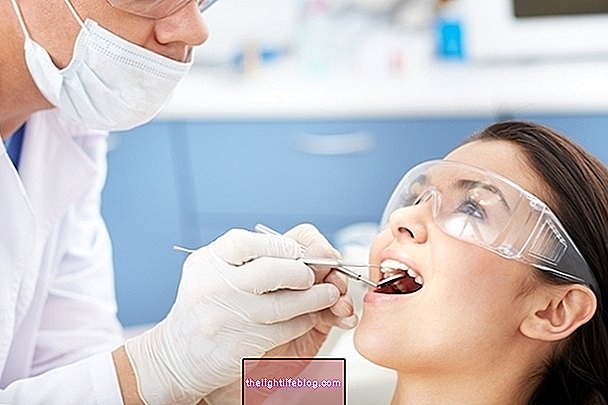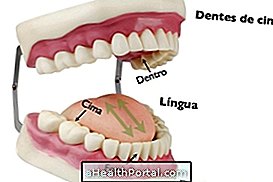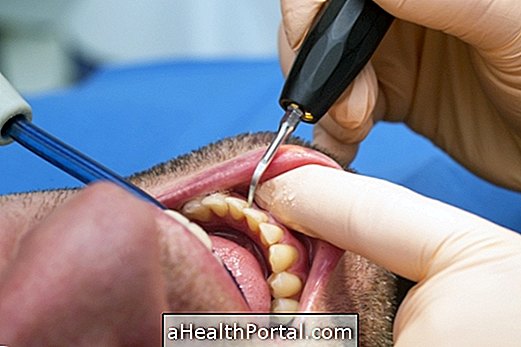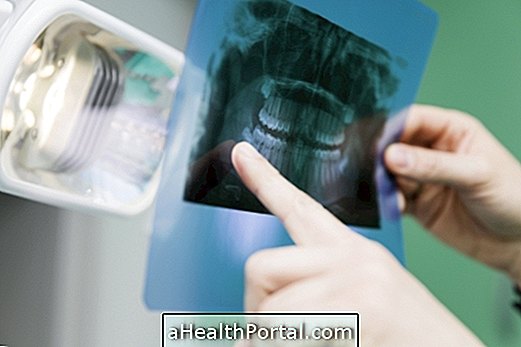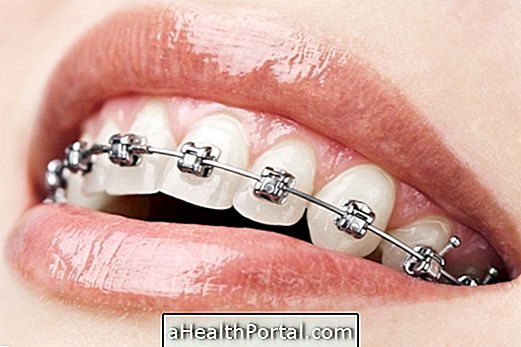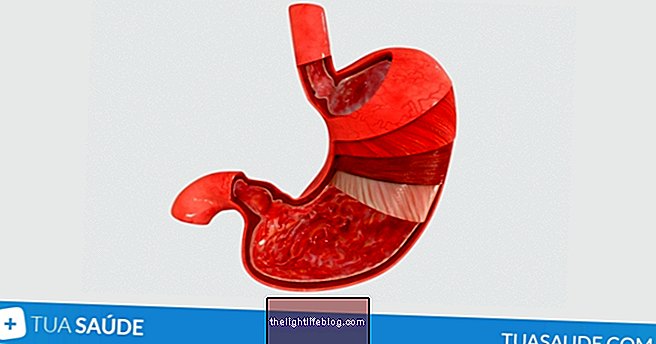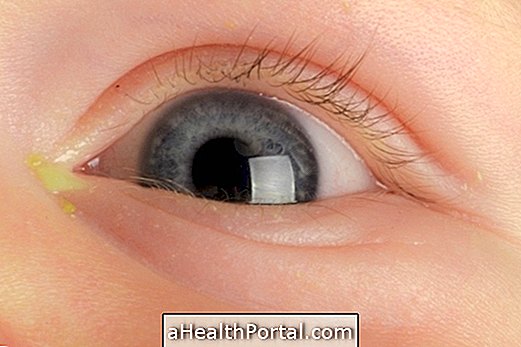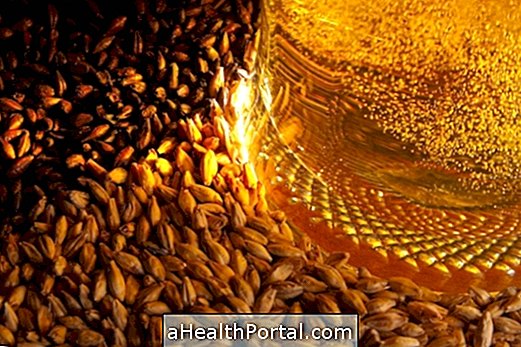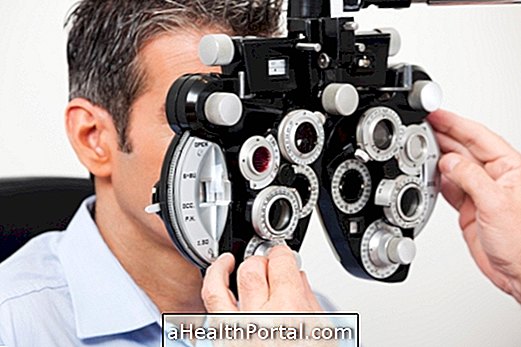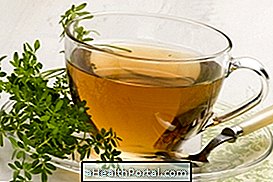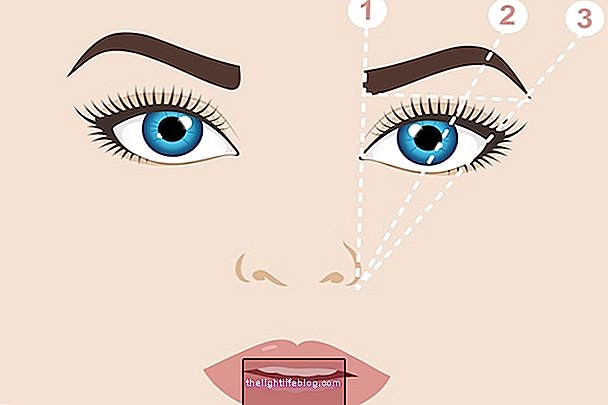Tartar corresponds to the calcification of the bacterial plaque that covers the teeth and part of the gums, forming a calcified and yellowish plaque and which, if left untreated, can lead to the appearance of stains on the teeth and favor the formation of cavities, gingivitis and bad breath.
To avoid the formation of tartar, it is necessary to brush your teeth well and floss regularly, in addition it is important to have a healthy diet, rich in minerals and low in sugar, since sugar favors the proliferation of microorganisms and, consequently, the formation of plaques and tartar.

How to identify
Tartar is characterized by a darker layer, usually yellowish, and adhered to the tooth that can be seen close to the gum, at the base and / or between the teeth even after brushing the teeth correctly.
The presence of tartar indicates that flossing and brushing are not being done correctly, which facilitates the accumulation of plaque and dirt on the teeth. Here's how to brush your teeth properly.
How to remove tartar
As tartar is strongly adhered to the tooth, removal at home is often not possible, even if the mouth is properly cleaned. However, a homemade option that is still widely discussed is the use of sodium bicarbonate, since this substance can penetrate the bacterial plaque and increase the pH, helping to fight the bacteria present there and helping to remove tartar.
On the other hand, the continued use of sodium bicarbonate is not recommended, as it may end up changing the porosity of the tooth and making it more sensitive. See more about homemade ways to remove tartar.
The removal of tartar is usually performed by the dentist during the dental consultation, in which a thorough cleaning is performed, which includes a kind of scraping to remove the plaques, leaving the teeth healthier and free from all dirt.During cleaning, the dentist also removes the accumulated plaque to prevent solidification and the formation of more tartar. Understand what plaque is and how to identify it.
How to prevent the formation of tartar
The best way to avoid the formation of tartar on your teeth is to maintain good oral hygiene, brushing your teeth always after meals and using dental floss, as it helps to prevent the accumulation of food residues that could not be removed by means of brushing.
Here are other tips for keeping your teeth healthy:

Test your knowledge
Take our online test to assess your knowledge of oral health:
- 1
- 2
- 3
- 4
- 5
- 6
- 7
- 8
Oral health: do you know how to take care of your teeth?
Start the test


It is important to consult the dentist:
- Every 2 years.
- Every 6 months.
- Every 3 months.
- When you are in pain or some other symptom.

Floss should be used every day because:
- Prevents the appearance of cavities between teeth.
- Prevents the development of bad breath.
- Prevents inflammation of the gums.
- All of the above.

How long do I need to brush my teeth to ensure proper cleaning?
- 30 seconds.
- 5 minutes.
- Minimum of 2 minutes.
- Minimum of 1 minute.

Bad breath can be caused by:
- Presence of cavities.
- Bleeding gums.
- Gastrointestinal problems like heartburn or reflux.
- All of the above.

How often is it advisable to change the toothbrush?
- Once a year.
- Every 6 months.
- Every 3 months.
- Only when the bristles are damaged or dirty.

What can cause problems with teeth and gums?
- The accumulation of plaque.
- Have a high sugar diet.
- Have poor oral hygiene.
- All of the above.

Inflammation of the gums is usually caused by:
- Excessive saliva production.
- Accumulation of plaque.
- Tartar build-up on teeth.
- Options B and C are correct.

In addition to the teeth, another very important part that you should never forget to brush is:
- Tongue.
- Cheeks.
- Palate.
- Lip.
Was this information helpful?
Yes No
Your opinion is important! Write here how we can improve our text:
Any questions? Click here to be answered.
Email in which you want to receive a reply:
Check the confirmation email we sent you.
Your name:
Reason for visit:
--- Choose your reason --- DiseaseLive betterHelp another personGain knowledge
Are you a health professional?
NoMedicalPharmaceuticalsNurseNutritionistBiomedicalPhysiotherapistBeauticianOther
